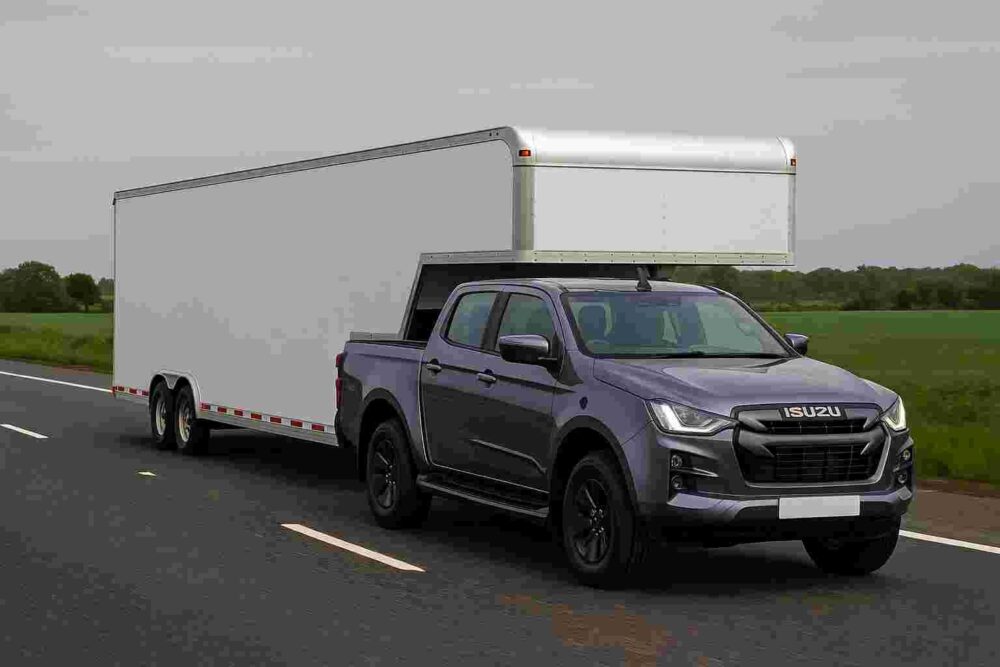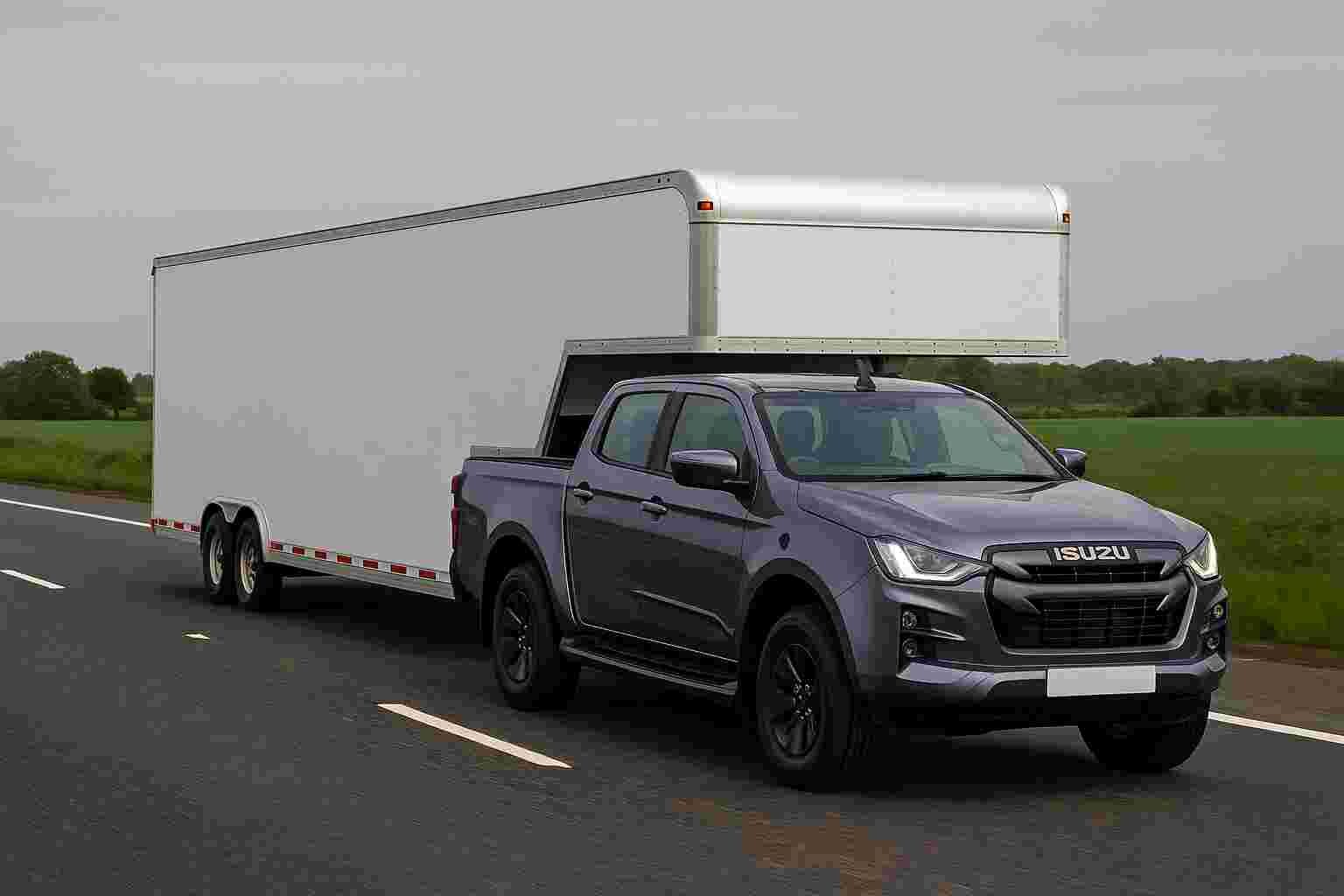Understanding the Big Shift
If you drive a double-cab pick-up for work, the world of company vehicle tax is about to look very different. From 6 April 2025, HMRC is reclassifying many double and extended-cab pick-ups as company cars rather than commercial vehicles for Benefit-in-Kind (BIK) and Capital Allowance (CA) purposes.
It might sound like a small technical change, but in practice, it could have a big financial impact on drivers, fleet operators, and especially those who tow heavy or converted trailers as part of their business.
Let’s unpack what’s changing, why it matters, and how it could affect towing professionals — from tradespeople to fleet managers, and anyone using American-converted trailers.

What’s Changing for Pick-Up Drivers?
Under the new rules:
- Double-cab and extended-cab pick-ups will be treated as company cars for BIK and capital allowance purposes.
- Single-cab pick-ups remain classed as commercial vehicles — these are unaffected.
- The change follows a Court of Appeal ruling that found many of these vehicles are not used “primarily” for carrying goods, but rather as mixed-use vehicles (for both people and payload).
- The new classification applies to vehicles ordered, purchased, or leased on or after 6 April 2025.
That means if your vehicle is used for both work and private use — such as towing a caravan, horse trailer, or American-style cargo trailer — you’ll now fall under car tax rules, which are based on CO₂ emissions and vehicle list price.
What Does This Mean for Benefit-in-Kind (BIK)?
Instead of the flat commercial rate used previously, your company pick-up will now attract car-style BIK charges, which range from 3% to 37%, depending on emissions.
For example, a high-powered diesel pick-up could easily sit in the upper BIK brackets, significantly increasing the amount of tax the driver or company pays each year.
Electric or hybrid pick-ups (if available in future) will start with lower BIK rates, but for most drivers today, the change represents a considerable increase in taxable benefit.
Capital Allowances and VAT
From April 2025, these pick-ups will also lose their “plant and machinery” status for capital allowances.
Instead, they’ll follow the same writing-down rates as company cars, depending on emissions (6%, 18%, or 100% for zero-emission models).
The good news?
✅ VAT reclaim remains possible for businesses making fully taxable supplies, as long as the payload exceeds 1 tonne.
And the Vehicle Excise Duty (VED) — your annual road tax — stays the same at the flat commercial vehicle rate of £345.
Transitional Protection
If you already own or have ordered your pick-up before 6 April 2025, you’ll keep the old commercial vehicle treatment until:
- The vehicle is sold or replaced, or
- 5 April 2029 (whichever comes first).
So, if you’re considering upgrading your fleet, ordering before April 2025 could lock in thousands in potential tax savings over the next few years.
FAQs — Pick-Up Truck Tax Explained
Let’s answer some of the most common questions drivers are asking.
❓ Are double and extended cab pick-ups now classed as company cars?
Yes. From 6 April 2025, double and extended cab pick-ups are treated as company cars for BIK and capital allowance purposes.
❓ Do these changes affect all pick-ups?
No. Single-cab pick-ups are not affected and will continue to be treated as commercial vehicles for all tax purposes.
❓ Has road tax (VED) changed?
No. The annual road tax remains a flat £345 commercial rate.
❓ Can I still reclaim VAT on my pick-up?
Yes. If your vehicle has a payload exceeding 1 tonne and is used for fully taxable business purposes, you can still reclaim VAT.
❓ How will BIK now be calculated?
It’s based on CO₂ emissions and vehicle list price, using the same sliding scale as company cars (from 3% to 37%).
❓ What happens if I already own or have ordered a pick-up?
If your vehicle is ordered or purchased before 6 April 2025, you’ll keep the old rules until 2029 — unless the vehicle is sold, disposed of, or your lease ends earlier.
❓ Why are these changes happening?
The move follows a Court of Appeal ruling which found that many double-cab pick-ups are used for both personal and commercial purposes — meaning they no longer meet the strict definition of “goods vehicles.”
❓ Are manufacturers responding to these changes?
Yes. Brands like Isuzu have introduced modified models such as the V-Cross Commercial, a two-seat derivative that retains commercial classification — designed specifically to help businesses stay compliant and avoid higher BIK costs.
Impact on Drivers Towing American-Converted or Large Trailers
Here’s where things get particularly relevant for those of us in the towing and trailer industry.
If you’re towing a heavy American-converted trailer, horsebox, or large plant trailer, you’ll need to consider the knock-on effects of these tax changes:
1. Higher BIK Costs
Many double-cab pick-ups used for towing have higher CO₂ emissions — meaning your BIK percentage will rise sharply. What was once a cost-effective fleet option could now carry a tax bill similar to an SUV.
2. Payload and Vehicle Weight
Heavier towing gear (reinforced tow bars, couplings, electric braking systems, etc.) can reduce payload capacity. If your vehicle dips below the 1-tonne threshold, you could lose your VAT reclaim eligibility — and in some cases, your commercial classification altogether.
3. Licensing and Compliance
Many American-converted trailers exceed UK standard width, weight, or brake requirements. With pick-ups now taxed like cars, it becomes even more important to ensure your combination is licensed correctly (B+E entitlement) and fully compliant with UK towing law.
4. Reduced Capital Allowance Benefits
Modifications such as heavy-duty towing electrics or reinforced chassis may no longer qualify for rapid tax write-offs. Expect longer depreciation schedules and reduced allowances.
5. Timing Matters
If you’re considering new vehicles or towing conversions, try to complete purchases before April 2025 to benefit from the old commercial rules until 2029.
6. Consider Dedicated Commercial Vehicles
For those whose work revolves around towing, it may now make more sense to run purpose-built commercial vehicles — such as van-chassis units or small trucks — that keep cleaner tax treatment and simpler compliance.
What Should You Do Next?
If you rely on a pick-up for towing, here’s a practical checklist:
✅ Audit your fleet — identify which vehicles are affected by the April 2025 changes.
✅ Order early — purchases made before 6 April 2025 stay under the old regime until 2029.
✅ Check payload capacity — especially if you’ve fitted towing gear.
✅ Seek advice — your accountant or fleet manager can confirm VAT and capital allowance implications.
✅ Stay compliant — make sure your trailer and towing combination meet UK standards.
Final Thoughts
The 2025 pick-up tax changes mark a turning point for UK businesses that rely on these vehicles every day. While it might feel like just another rule change, the real-world cost could be significant — especially for those towing heavy or specialist trailers.
If you use your pick-up for towing, now’s the time to:
- Re-evaluate your vehicle choices,
- Double-check your compliance, and
- Consider locking in current tax benefits before the April 2025 deadline.
For anyone towing large or converted trailers, these changes highlight why training, safety awareness, and proper vehicle selection are more important than ever.
💡 At Towing Solutions, we help drivers and businesses across the UK stay safe, compliant, and confident on the road.
From Trailer Safety & Awareness and Loading & Securing courses to Fleet Towing Assessments, we’re here to make sure your team is always ready for what’s ahead.
🔗 Explore our business towing and safety courses here: www.towing-solutions.co.uk/industry-courses/trailer-safety-awareness
